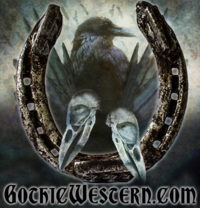On the surface it would seem that in remaking the 1969 John Wayne film True Grit, the Coen brothers (Ethan and Joel) have remade a good film into a great film. But it is a misnomer to call this a straight remake, the Coens wisely chose instead to adapt Charles Portis’ novel. In using the novel as a basis for the story, along with authentic dialog, wardrobe and set design, the Coens have made a modern western that stands instantly with the classics. In addition to the gothic western style and brooding tone, the film looks incredibly beautiful, mainly thanks to regular DP Roger Deakins’ stunning cinematography. Add this to Jeff Bridges and Hailee Steinfeld’s outstanding performances and you have one of the best films ever in this genre.
 Following the murder of her father by hired hand Tom Chaney, 14-year-old farm girl Mattie Ross sets out to capture the killer. To aid her, she hires the toughest U.S. marshal she can find, a man with “true grit,” Reuben J. “Rooster” Cogburn. Mattie insists on accompanying Cogburn, whose drinking, sloth, and generally reprobate character do not augment her faith in him. Against his wishes, she joins him in his trek into the Indian Nations in search of Chaney. They are joined by Texas Ranger LaBoeuf, who wants Chaney for his own purposes. The unlikely trio find danger and surprises on the journey, and each has his or her “grit” tested.
Following the murder of her father by hired hand Tom Chaney, 14-year-old farm girl Mattie Ross sets out to capture the killer. To aid her, she hires the toughest U.S. marshal she can find, a man with “true grit,” Reuben J. “Rooster” Cogburn. Mattie insists on accompanying Cogburn, whose drinking, sloth, and generally reprobate character do not augment her faith in him. Against his wishes, she joins him in his trek into the Indian Nations in search of Chaney. They are joined by Texas Ranger LaBoeuf, who wants Chaney for his own purposes. The unlikely trio find danger and surprises on the journey, and each has his or her “grit” tested.
 True Grit received critical acclaim. Roger Ebert awarded 3.5 stars out of 4, writing, “What strikes me is that I’m describing the story and the film as if it were simply, if admirably, a good Western. That’s a surprise to me, because this is a film by the Coen Brothers, and this is the first straight genre exercise in their career. It’s a loving one. Their craftsmanship is a wonder”, and also remarking, “The cinematography by Roger Deakins reminds us of the glory that was, and can still be, the Western.”
True Grit received critical acclaim. Roger Ebert awarded 3.5 stars out of 4, writing, “What strikes me is that I’m describing the story and the film as if it were simply, if admirably, a good Western. That’s a surprise to me, because this is a film by the Coen Brothers, and this is the first straight genre exercise in their career. It’s a loving one. Their craftsmanship is a wonder”, and also remarking, “The cinematography by Roger Deakins reminds us of the glory that was, and can still be, the Western.”
The Los Angeles Times critic Kenneth Turan gave the film 4 out of 5 stars, writing, “The Coens, not known for softening anything, have restored the original’s bleak, elegiac conclusion and as writer-directors have come up with a version that shares events with the first film but is much closer in tone to the book… Clearly recognizing a kindred spirit in Portis, sharing his love for eccentric characters and odd language, they worked hard, and successfully, at serving the buoyant novel as well as being true to their own black comic brio.”



